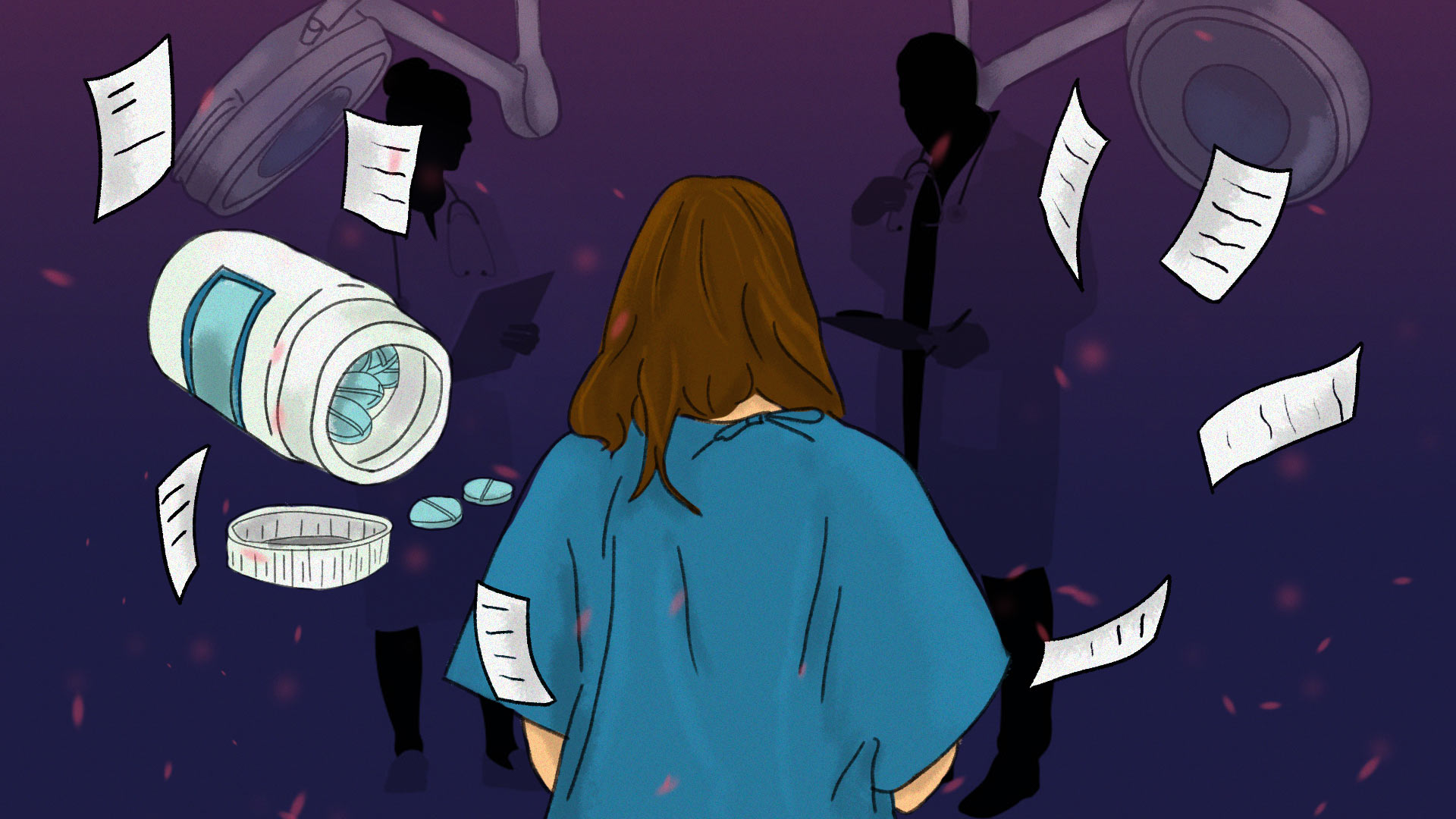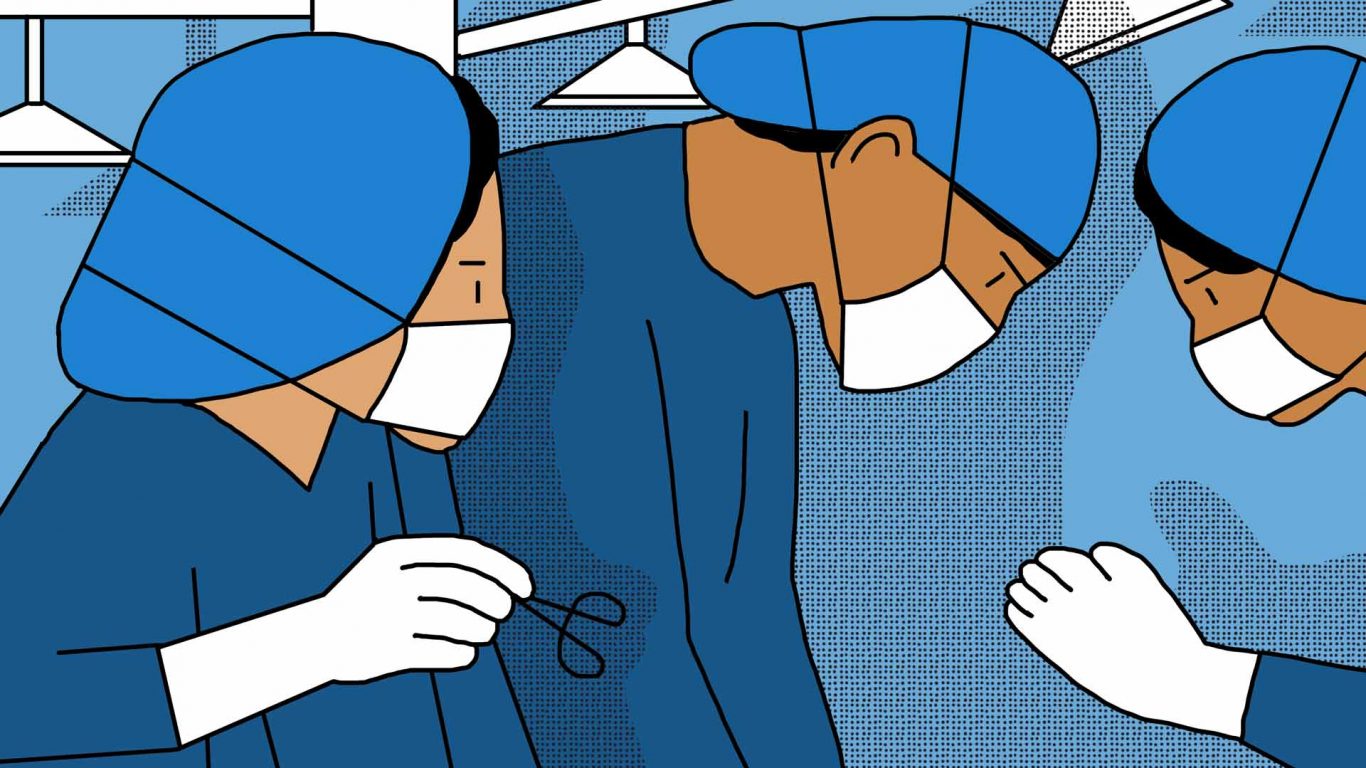Due to insufficient stocks, no institution was able to provide her with the necessary medication to perform a voluntary interruption of pregnancy (abortion). Thanks to an acquaintance, Zeineb finally managed to go through with a clandestine abortion. "If it hadn't been for this sisterhood, I wouldn't have been able to do it", she says.
"Whether the law allows it or not, this is my right. I'm ready to rip it out if I have to."
As an exception in the region, Tunisia legalised abortions in 1973. In theory, any woman is supposed to have access to a free abortion during the first trimester of her pregnancy, either through vacuum aspiration (surgical abortion) or medical abortion*.
However, almost fifty years after the law came into force, women are still faced with numerous obstacles. Medicine shortages, dissuasion by medical practitioners, regional inequalities... Abortion is a struggle for many women, and its legality is sometimes even up for public debate. In 2013, MP Najiba Berioul of the National Constituent Assembly, proposed to criminalise abortion in the upcoming Constitution.
"Access to abortion is becoming increasingly restricted, although there aren't any prohibitions", says Selma Hajri, founder of the association Tawhida Ben Cheikh, which works to promote sexual and reproductive rights. While the right to abortion is now being challenged by the Supreme Court in the United States as well as elsewhere, what is the status in Tunisia? Is this legal right truly guaranteed?
A right that varies with geographical location
Theoretically, abortion should be available free of charge to all women throughout all public health facilities accross the country. According to a UNFPA (United Nations Population Fund) report, 72 institutions - about 50 hospitals and 24 family planning centres in each governorate - were performing surgical abortions in 2010. Today, only "two [hospitals], one in Tunis and the other in Sousse, offer surgical abortion", says Fatma Temini, deputy director of the National Office for Family and Population (ONFP). Some family planning centres also perform abortions, but we were not able to obtain clear statistics on this.
As a result, when a medical abortion has not been possible due to a shortage of medicine or when the time limit for legal abortion has passed, women have very few options for obtaining an abortion through the public sector.
"When there is a stock shortage [of abortion medicine], women can no longer access abortion", says Selma Hajri, director of the Tawhida association.
Zeineb has experienced this first hand. When she found out she was pregnant, the young woman had only two weeks left to obtain a medical abortion. "I went to see the head of department [of a hospital]", she recalls, but was asked to wait because there were no pills. But for Zeineb, this was an emergency: for medical reasons, she was not able to have a surgical abortion. "I couldn't wait", she says.
In addition to the medicine shortages, public institutions also suffer from a lack of staff.
"If someone retires or moves, they are never replaced", says a midwife from the Gafsa region.
These shortcomings are even more glaring in disadvantaged regions. In Tunis, for every 10,000 women, there are eight gynaecology and obstetrics specialists, compared to less than one doctor for every 10,000 women in Tataouine or Siliana.
Gynaecologist distribution per 10,000 women of childbearing age
Source: 2019 Health Map, Ministry of Health.
Moreover, according to another UNFPA report, the lack of local anonymity in rural areas forces women to travel long distances to obtain an abortion. "The staff often live locally, it's a problem, it's bad for the privacy of the patients", said a midwife working in a Basic Health Centre in the North East.
The private sector, an option by default
Faced with the many shortcomings of public services, some women prefer to turn to the private sector, as demonstrated by statistics: there are three times as many abortions performed in private clinics, according to estimates from 2011.
According to several doctors, patients have to pay between 300 and 500 dinars on average for a (surgical) vacuum aspiration abortion in a private clinic. This surgical practice is generally preferred to medical abortion.
The practitioners interviewed explain that they resort to this method because of the medicine shortages. "Sometimes I send patients to the clinics to take medicines and there are none left", says gynaecologist Cyrine Ben Miled.
Dr. Skander Ben Alaya has made the same observation. "For the past two years we have had a shortage of abortion medicines, so I only do surgical abortions." The gynaecologist blames this situation on the Covid-19 epidemic and points out that this concerns abortions "worldwide".
According to Selma Hajri, the reasons behind this practice are primarily financial. "Medically induced abortion does not make money, neither for doctors nor for the clinics", she remarks. The gynaecologist Cyrine Ben Miled acknowledges that this type of abortion is more "lucrative for the doctors", while specifying that this procedure is also "more comfortable because there are few or no failures".
Despite some available statistics, these activities in the private sector remain very obscure. It is difficult to access any accurate data in the sector.
"I have never been held accountable to anyone. Follow-ups, failures etc. It is not recorded at all, there is no register", explains Cyrine Ben Miled.
This lack of control of the private sector has harmful consequences. "There are probably abuses", says gynaecologist Cyrine Ben Miled. These abortions are sometimes performed up to the fifth or sixth month of pregnancy. The practice is illegal unless the pregnancy threatens the woman's physical or mental health, or if the fetus presents a real risk of developing a serious illness or disability. This is known as a therapeutic abortion or medical termination of pregnancy (MTP).
Moreover, the cost of the procedure is not always respected, especially when it comes to foreign patients - such as patients from Morocco, Libya, Algeria or the Gulf region - who cannot obtain an abortion in their home country. A quick search on the internet can easily find agencies offering "all-inclusive" deals for at least 600 euros, and in some cases more than 1000 euros.
On the same subject
"Come back in a week or two"
In a study by Selma Hajri, it was found that a quarter of the women interviewed had been refused an abortion. Several of the health care professionals interviewed by Inkyfada admit to having discouraged their patients from having abortions. Ahmed*, a gynaecologist who has worked in the public sector for twenty years, insists on the importance of having a long discussion with the woman to understand her situation. "I don't say yes to all women. Sometimes I don't advise it", he adds.
Asma, a midwife, believes that abortions are invasive and harmful to a woman's health and should be used as a last resort. "We always try to convince [women] to avoid having an abortion. We send her [to the planning centre] if she insists", she explains. But for Hajri, this demonisation of abortion is misplaced. In some cases, "it's much riskier to carry a pregnancy to term than to have an abortion", Hajri says.
As in Asma's case, invalid medical reasons are usually given to dissuade women from having an abortion. Selma Hajri tells of a diabetic woman who was refused an abortion because of her high blood sugar level. Other testimonies cite burdensome bureaucracy or the request for tests that are not required by law, such as anaemia tests that can delay the operation.
Respecting the time limits also depends on the practitioner in question. There is some vagueness surrounding Article 214. Abortion is allowed during "the first three months of pregnancy", according to the Penal Code. Internationally, abortion time limits are usually calculated in terms of weeks of amenorrhoea, i.e. the number of weeks without menstruation.
This lack of a precise limit leaves doctors free to interpret. "Some refuse to perform abortions after 9 weeks of amenorrhoea, others after 10, and many clinics refuse after 12 weeks", laments gynaecologist Cyrine Ben Miled. However, a three-month pregnancy corresponds to 14 weeks of amenorrhoea, not 12.
All of these factors hinder abortions, leading to an increased risk of unwanted pregnancies for women. "We waste a lot of women's time. They are sent back and forth for all sorts of reasons", says the president of the Tawhida association.
"There is a strike. The doctor is not here. The machine is broken. Come back in a week or two...".
Most of the health personnel we interviewed feel that the right to abortion has been challenged since 2011, following the rise of the Islamist political party Ennahdha. Although it is true that some party representatives have expressed hostility towards this legislative measure, such as MP Najiba Berioul, the opposition to abortion goes back much further.
"Already in the 1980s, there were quite significant forms of humiliation of women by health care personnel", describes Irene Maffi, an anthropologist specialising in gender studies. According to her, the emergence of a moralising discourse after 2011 has more to do with freedom of speech than with an ideological change. "You can express yourself publicly and act freely, without too much fear of being fired", she says.
A lack of political commitment
Beyond the anti-abortion rhetoric, many also emphasise the deterioration of public services after the revolution. Selma Hajri denounces the lack of training for medical staff at the National Family and Population Office (ONFP), the organisation responsible for family planning.
This institution additionally suffers from many other shortcomings. Anouar El Ouafi, secretary general of the ONFP trade union, cites financial mismanagement and arbitrary appointments, resulting in the establishment being run by "a sort of mafia". "People were appointed to head the institution who had nothing to do with it", says Ahmed. In 10 years, more than nine CEOs have succeeded each other, the last of whom resigned on April 29, according to staff members. According to Anouar El Ouafi, this situation has implications for the functioning of family planning centres and, consequently, for the respect of the right to abortion.
The ONFP union plans to organise a strike in July to alert the authorities to the urgent need for intervention, following several requests to the Ministry of Health and the National Anti-Corruption Commission. "We only demand for this institution to be given a strategy, for a CEO to be appointed, and for it to be cleared of all persons with ongoing corruption cases, as long as they have not been found innocent", says Anouar El Ouafi.
An acute need for reform
Thus, while the country was a trail blazer in the legalisation of abortion in 1973, Tunisia is now demonstrating several shortcomings in the practical implementation of this right. According to feminist activist Nessryne Jellali, there is a lack of "accountability" on the part of the medical practitioners.
"No woman has filed a complaint against a doctor who refused her an abortion."
She insists that "it is time" to now raise the issue of criminalisation.
Unlike in many other countries, health care professionals who refuse to perform this medical procedure are not subject to any penalisation. "It should be penalised", Cyrine Ben Miled adds. At the very least, doctors who refuse to perform this procedure should be obliged "to refer the patient to a colleague who will", says the gynaecologist. "No one goes through with an abortion out of the blue [...] so rather than burdening the women, they should be helped and supported."






